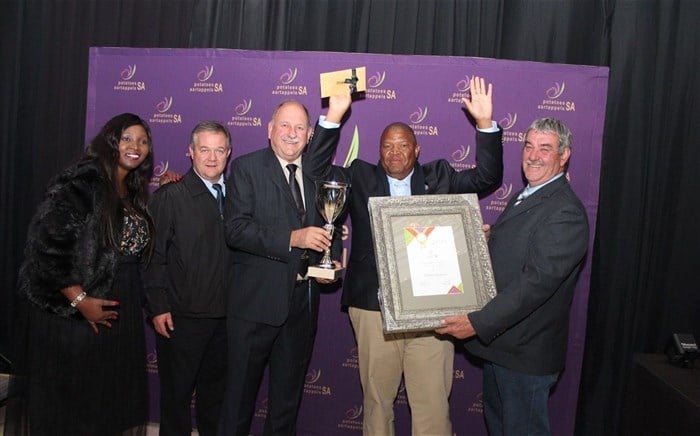
The criteria for selecting the three finalists included the candidate being a Potatoes South Africa Enterprise Development Programme producer who has been on the programme for at least three years or more – planting a minimum of five hectares of potatoes, be a levy payer and have the ability to pay the required own contribution towards the programme.
Candidates were required to participate in industry meetings and events organised by Potatoes South Africa, as well as participating in the expansion programme or be able to expand without Potatoes South Africa support. The finalists included Vuyani Kama from Ugie in the Eastern Cape, David Phike from Welkom in the Western Free State and Phophi Raletjena from Vivo in Limpopo.
Raletjena started potato production in earnest in 2010 on a small-scale of five hectares, renting machinery from commercial farmer, and his mentor, Auwke Jongbloed. He grew from strength to strength and required more land for crop rotation. A successful application to the Department of Rural Development enabled Raletjena to lease the farm in Vivo where he has been farming with potatoes for the last six years. Raletjena then joined the Potatoes South Africa Enterprise Development Programme, starting out with five hectares under potato production and has now expanded to 30 hectares under irrigation.
Following a four-year rotation cycle, Raletjena alternated his potatoes with animal feed and maize – he also has a breeding stock of 100 Bonsmaras. Having heavy soil with a high percentage of calcium, which is an advantage, but highly deficient in phosphorous has to be augmented before planting – Raletjena has a soil analysis done every time before planting. As erosion is a problem in the area, he builds contours to protect his soil and buys only certified seed and plants mostly Mondial. His fertiliser programme is based on the soil analysis and recommendations from the laboratory – all his potato fields are under centre pivot irrigation. Usually, the early crop is planted in February and the late crop in June/July.
Raletjena is vigilant against pests and diseases and inspects his fields on a daily basis and says: "The leaves are the factory and the potatoes rely on the leaves for photosynthesis especially during the bulking stage. Once you lose your leaves to a disease or a pest, you may lose your crop. That is why it is important to treat your seed for preventative purposes and you need to control your soil and airborne diseases."
Raletjena aims for 50 tonnes per hectare as a benchmark on Mondials, but sometimes he harvests 55 tonnes. The bulk of the potatoes produced by Raletjena is sold to Mozambican buyers unwashed in 10kg bags. Raletjena recently developed the branding of his own bags with information in both English and Portuguese, and in three colours for the various classes. What is key to marketing is customer satisfaction. Raletjena understands the needs of his target market and explains that unwashed potatoes have a longer shelf life than washed potatoes. Raletjena says: "When you wash potatoes, you compromise on shelf life, whereas the latter is a requirement of the Mozambican buyers."
Keeping in mind that he is also producing other crops, Raletjena employs 12 permanent labourers and an average of 60 seasonal workers when it is potato harvesting time, packing between 10,000 and 11,000 bags per day, and stays abreast of the latest information on potatoes and eagerly increases his knowledge by reading articles, attending courses presented by Potatoes SA and the Transformation Symposium as well as attending workshops presented by fertiliser and chemical companies.
Articles on technical production, marketing and finance in Chips magazine is one of his sources of expanding his knowledge and he is grateful to still be on the Potatoes SA Enterprise Development Programme. As the farm is reliant on underground water which is a limited resource, making better use of water optimisation is an area in which Raletjena would like to see more research done.
Raletjena ascribes his success to firstly, increasing his yield and secondly, the ability to source and access information and to learn from others. He says that how you sell and price your product is very important as well as the relations with various stakeholders in the industry. Raletjena says: "In comparison to my peers, I’d say that I have seen many who have started and failed on account of farming as a second option, not as the main source of their income. If you want your livelihood to come from it, you must make it work – that propels one to succeed."